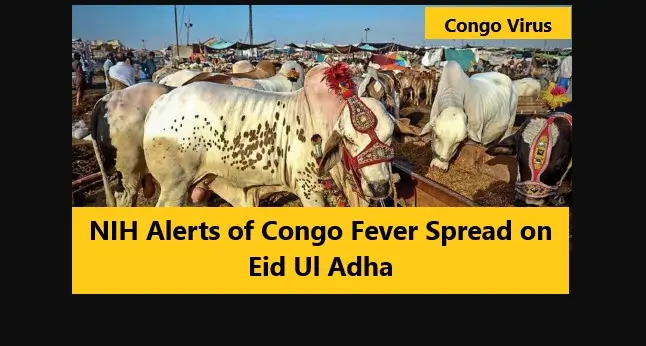NIH Alerts of Congo Fever Spread on Eidul Azha
NIH Alerts of Congo Fever Spread on Eidul Azha.
Eid al-Adha and Congo Virus: NIH Warns of Potential Increase in Cases
The National Institute of Health (NIH) has issued an advisory raising concerns about a possible rise in Congo virus cases during the upcoming Eid al-Adha celebrations.
This Muslim holiday traditionally involves the sacrifice of animals, and the NIH warns that increased contact with livestock could heighten the risk of transmission.
Read More: Balochistan Issues Congo Virus Red Alert
Why the Concern?
The Congo virus, also known as Crimean-Congo hemorrhagic fever (CCHF), is a zoonotic disease, meaning it can jump from animals to humans. Ticks are the primary carriers of the virus, and close contact with infected animals or their carcasses can lead to transmission.
Eid al-Adha and Increased Risk:
During Eid al-Adha, the slaughtering and handling of livestock significantly increases the opportunities for human-animal contact. This heightened interaction creates an environment where tick-borne diseases like CCHF can potentially spread more easily.
The NIH’s Recommendations:
The NIH urges public health departments and citizens to remain vigilant and take necessary precautions to mitigate the risk of Congo virus transmission.
Here are some key points from the advisory:
- Increased Awareness: Healthcare providers and the general public should be aware of the potential for a CCHF surge during Eid al-Adha.
- Protective Measures: People handling livestock should wear light-colored clothing that allows for easy detection of ticks on their garments.
- Personal Hygiene: Regular handwashing with soap and water is crucial, especially after handling animals or animal products.
- Animal Health: Proper veterinary care for livestock can help reduce tick infestations and the risk of zoonotic diseases.
- Reporting Symptoms: Individuals experiencing fever, muscle aches, or other potential CCHF symptoms should seek immediate medical attention.
Beyond Eid al-Adha: Protecting Yourself from Congo Virus
While Eid al-Adha may pose a heightened risk, it’s important to maintain awareness of CCHF year-round. Here are some additional tips to safeguard yourself:
- Avoid Contact with Ticks: Wear protective clothing and insect repellent when spending time outdoors in areas with known tick populations.
- Practice Safe Food Handling: Ensure proper cooking temperatures for meat products to eliminate potential pathogens.
- Travel Precautions: If traveling to regions with a high prevalence of CCHF, consult with a healthcare professional about necessary vaccinations and preventive measures.
By following these recommendations and remaining vigilant, we can minimize the risk of Congo virus transmission and ensure a safe and healthy Eid al-Adha celebration for everyone.
Note: The information above might not be accepted 100%. Please verify from your own sources. We will not be responsible for any kind of loss due to our content.
For more news, please visit Munafa Marketing.




